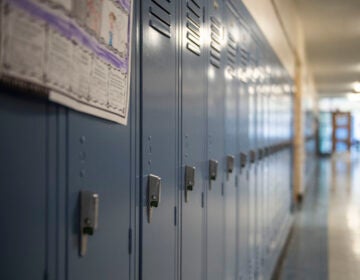Ratings firm deems Murphy’s school funding veto a ‘credit negative’
Moody’s Investors Service’s opinion underscores the continued challenges many districts face as a result of the state’s school funding policies

Gov. Phil Murphy, right, and Senate President Steve Sweeney are at odds over allowing some districts to fill school funding gap by going over 2% property tax cap. (NJ Spotlight)
This article originally appeared on NJ Spotlight.
–
A major Wall Street credit-rating firm has labeled as “credit negative” Gov. Phil Murphy’s recent rejection of legislation that sought to make it easier for some school districts to go over the state’s 2% cap on annual property tax increases.
Moody’s Investors Service’s opinion, issued this week, doesn’t go so far as to change the credit rating for any of the K-12 districts that would have benefited from the proposed policy change, which Senate President Steve Sweeney (D-Gloucester) championed in the Legislature.
But it further underscores the continued challenges that many districts are facing after state school funding policies were revised in 2018, leaving some districts with smaller state-aid payments even as the overall share of state spending on K-12 education has increased.
Sweeney’s proposal would have allowed some districts to fill the funding gap with revenue from local property taxes, but Murphy roundly criticized his remedy in a Jan. 13 veto message that suggested local property taxes are already high enough in New Jersey.
Moody’s take on the governor’s veto is that it was a “credit negative” for New Jersey school districts because it “constrains their ability to balance operations amid declines in state aid.”
In response, Sweeney said the Moody’s opinion echoes what he and others “have been saying for weeks.” A spokesman for Murphy said the governor “remains prepared to work with the Legislature on alternative approaches to the school-funding issue.”
Full state school aid in five years
Sweeney put forward the bill that Murphy ultimately vetoed to try to address concerns about the school funding deal he struck with the Democratic governor in 2018. Enacted through a law known as S2, the deal set goals for full funding of the state’s school aid formula but also mandated reductions for some districts that were labeled “overfunded. ”
After many of those districts complained about losing aid, Sweeney proposed giving those considered to be spending below the state’s “adequacy” standard the right to exceed the 2% cap on annual property tax-levy increases without having to go before voters. (Under current law, school districts and other local governments can exceed the 2% cap only with voter authorization.)
While Sweeney’s proposal drew support from groups like the New Jersey School Boards Association and was passed by both houses of the Democratic-controlled Legislature, Murphy and others rejected the notion that local property taxes should be used to offset the loss of state aid.
In his veto, the governor raised concerns about how quickly Sweeney’s bill was drafted and moved through the Legislature in the final weeks of the last two-year session. He suggested the issue deserved more thoughtful deliberation.
He also repeated his call for a higher state income tax on earnings between $1 million and $5 million, a proposal Sweeney and other lawmakers have steadfastly resisted since Murphy took office in early 2018.
“I do not accept the notion that the State’s only response to school districts that are seeking help should be to let them raise property taxes on their residents without their approval,” Murphy said in the veto message.
In its analysis of the landscape for school districts in the wake of the veto, Moody’s noted they already face legal restrictions when it comes to maintaining budget reserves even as they are also forced to live under the 2% cap on annual levy increases. (The cap allows only a handful of exceptions, including for debt payments, and worker pension and health care costs.)
‘Draining their reserves’
“A greater ability to increase property tax revenues would have allowed districts to balance operations without draining their reserves,” Moody’s said.
Of the school districts the ratings firm keeps close tabs on, the six that it considered to be the “most affected” by Murphy’s veto are: Vernon Township, Great Meadows Regional, Ocean Township, Monmouth Regional, Springfield Township (Burlington County) and Neptune City.
Moody’s tempered its overall conclusion by noting the districts’ loss of aid as a share of overall operating revenues is not as dramatic as the loss is in relation to their cash balances. Sweeney issued a statement in response to the Moody’s analysis that called Murphy’s veto “fiscally irresponsible.”
“Moody’s confirmed (this week) what legislative leaders, the New Jersey School Boards Association, and responsible superintendents and school board officials across the state have been saying for weeks,” Sweeney said.
The statement from Murphy spokesman Darryl Isherwood repeated a pledge to work together to find a solution that was first made in the veto message, and also pointed back to Murphy’s millionaires tax proposal.
“The governor believes there are other avenues to address the issue of school funding, including a tax on residents making more than $1 million per year, who are in a better position to help fund our education system than the already overburdened middle class,” Isherwood said.
WHYY is your source for fact-based, in-depth journalism and information. As a nonprofit organization, we rely on financial support from readers like you. Please give today.




